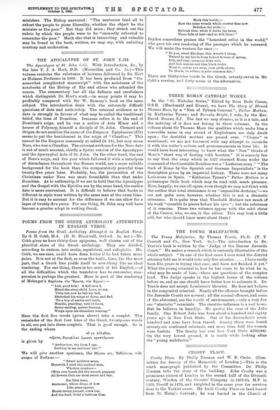POEMS FROM THE GREEK ANTHOLOGY ATTEMPTED IN ENGLISH VERSE.
Poems from the Greek Anthology Attemptzd in English Verse. By G. H. Cobb, M.A. (B. H. Blackwell, Oxford. Is. net.)—Mr. Cobb gives us here thirty-four epigrams, well chosen out of the plentiful store of the Greek anthology. They are divided, according to custom, into erotic, sepulchral, and eulogistic. Mr. Cobb, we are sure, could have done better if he had taken more pains. It is not at the first, or even the tenth, time, for the most part, that a Greek line yields itself to something like an ideal rendering. For one thing, there is too much of his English,—of all the difficulties which the translator has to encounter, com- pression is perhaps the greatest. Here is part of the rendering
of Meleager's Knini0VO, Tbv "Epwra, TbY :— " List, good folk! A bell-man I,
Hired the stray-child, Love, to cry. 'Twas but now he left his bed, Stretched his wings at dawn, and fled.
'Tis a boy of smiles and tears, Nimble, prattling, void of fears, Saucy-smiling, quiver-bearing, Wings upon his shoulders wearing."
Here the first five words (given above) take a couplet. The remainder of the first four lines of the Greek, twanty-one words in all, are put into three couplets. That is good enough. So is the ending where
oil /Le aAeOas,
T6t0Ta, Z7)1,04l(ACGS tiljACUT/ npurrouevos is given by " Archer-boy, thy form I spy,
Lurking in my mistress eye I "
We will give another specimen, the ri4era, co:, 'Po36aega, .robe avi•pos of Rufinus :— •
" Sweet mistress mine, Herewith I send this garland rare,
Wherein combine— (Mine own hands did the wreath prepare) All flowers that are most sweet and fair.
See lilies here, Anemones, whose drops of dew Like gems appear,
liarsh.loving jonquil, roses too, And the dusk violet's lustrous blue. Mark this beside,—
How the same wreath which crowns thee now Rebukes thy pride :— Bethink thee, while it decks thy brow, These fade at last—and so wilt thou I "
Dryden somewhere praises the " honestest critics in the world," who gave his own rendering of the passages which he censured. We will make the venture for once :-
" To you, sweet Rhodope, this wreath I bring,
Twined by my hands from fairest flowers of spring, Lily, and rose, anemone dewy-wet, And lush narciss and blue-black violet. Wear it, and as you wear, your pride abate ; To bloom, to wither, is your common fate."
There are thirty-nine words in the Greek, seventy-seven in Me Cobbs version, and forty-seven in the alternative.
























































 Previous page
Previous page